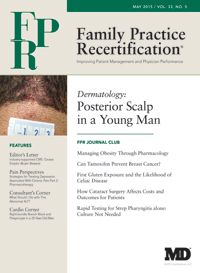Publication
Article
Family Practice Recertification
How Cataract Surgery Affects Costs and Outcomes for Patients
Author(s):
This is an observational cohort study of Medicare beneficiaries of patients undergoing cataract surgery in the year 2011. Using multivariate analysis, the authors determined the relationship between preoperative testing and patient characteristics, health systems' characteristics, surgical setting, surgical care team, and the occurrence of a preoperative office visit.
Review
“Lower Costs and Improve Outcomes for Patients Undergoing Cataract Surgery.” NEJM 2015; 372: 1530-1538.
Study Methods
This is an observational cohort study of Medicare beneficiaries of patients undergoing cataract surgery in the year 2011. Using multivariate analysis, the authors determined the relationship between preoperative testing and patient characteristics, health systems’ characteristics, surgical setting, surgical care team, and the occurrence of a preoperative office visit.
Results
Four hundred and forty thousand patients were studied who met the inclusion criteria. Fifty-three percent had at least one preoperative visit in the month before surgery. Expenditures on testing in the month prior were $4.8 million higher and expenditures on office visits were $12.4 million higher (42% and 48% higher respectively) than the mean monthly expenditures during the preceding 11 months. Testing varied among ophthalmologists with 36% of ophthalmologists ordering preoperative testing for more than 75% of their patients. A patient’s probability of undergoing testing was associated with the ophthalmologist who managed the preoperative evaluation.
Conclusion
Preoperative testing before cataract surgery occurred far more frequently than was medically necessary and was strongly associated with the provider overseeing the patient’s care.
Discussion
In 2007 the American College of Cardiology and the American Heart Association drafted guidelines for appropriate peri-operative cardiovascular evaluation and care for non-cardiac surgery (Circulation 2007; 116: e418-e500). These guidelines are an evidence-based approach on when preoperative testing is appropriate. They recommend additional evaluation ONLY if the patient has an unstable cardiac condition or three or more cardiac risk factors, or if the surgery is considered intermediate or high risk. Cataract surgery is contraindicated in those who are unstable. If clinically stable, the surgery is considered low risk.
Preoperative evaluation is not indicated for low risk surgery in otherwise stable patients. A nice algorithm depicting appropriate peri-operative evaluation is seen here (http://circ.ahajournals.org/content/116/17/e418/F2.expansion.html).
This paper identifies a subset of ophthalmologists who aggressively order preoperative visits and testing on patients when it is not medically necessary. Unnecessary testing leads to an increased morbidity and mortality due to the risk of falsely positive findings. The resultant adverse outcomes occur based upon the medico-legal pressure to explain these false-positive abnormalities delay surgery, and incur further testing that may lead to interventions like cardiac catherization or other invasive procedures.
What is worrisome is one third of ophthalmologists, surgeons skilled in peri-operative procedures, are the individuals ordering these tests and visits. The potential reasons for doing this include the hope to lower their malpractice risk, or the desire to increase billings.
How can doctors in family medicine apply this to their practice as it is the ophthalmologists who are ordering these tests? First, consider a gentle reminder of the American Heart Association guidelines to your surgical ophthalmologist. If that does not change outcomes, reconsider how you refer your patients.
Ophthalmologists are highly reimbursed for their procedures and we are far less so for interpreting false positive results. It becomes our responsibility to follow up lab results, even those we did not order, for the health of our patients. Continuing an evaluation of an unnecessary test could lead to adverse outcomes. Who you refer to and whom you support in practice influences your patient’s health and Medicare’s budget. Choose wisely.






